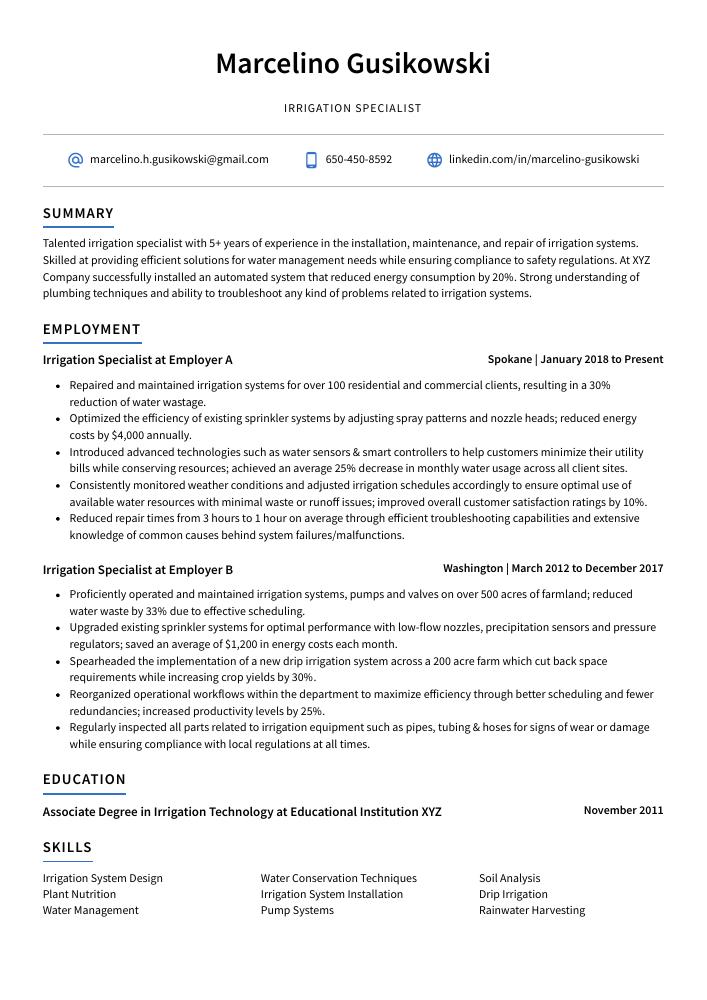Irrigation Specialist Resume Guide
Irrigation specialists are responsible for designing, installing, and maintaining irrigation systems. They analyze soil conditions to determine the most efficient way of watering crops or gardens, and they use their knowledge of hydraulics to ensure that water is being distributed properly throughout a system. Additionally, they monitor current systems to detect potential problems and repair them as needed.
You know how to properly install, maintain and repair irrigation systems like no one else. But employers in the landscaping industry don’t yet know your name. To make sure they recognize you for your expertise, create a resume highlighting all of it.
This guide will walk you through the entire process of creating a top-notch resume. We first show you a complete example and then break down what each resume section should look like.
Table of Contents
The guide is divided into sections for your convenience. You can read it from beginning to end or use the table of contents below to jump to a specific part.
Irrigation Specialist Resume Sample
Marcelino Gusikowski
Irrigation Specialist
[email protected]
650-450-8592
linkedin.com/in/marcelino-gusikowski
Summary
Talented irrigation specialist with 5+ years of experience installing, maintaining and repairing irrigation systems. Skilled at providing efficient solutions for water management needs while ensuring compliance with safety regulations. At XYZ Company successfully installed an automated system that reduced energy consumption by 20%. Strong understanding of plumbing techniques and ability to troubleshoot any kind of problems related to irrigation systems.
Experience
Irrigation Specialist, Employer A
Spokane, Jan 2018 – Present
- Repaired and maintained irrigation systems for over 100 residential and commercial clients, resulting in a 30% reduction in water wastage.
- Optimized the efficiency of existing sprinkler systems by adjusting spray patterns and nozzle heads; reduced energy costs by $4,000 annually.
- Introduced advanced technologies such as water sensors & smart controllers to help customers minimize their utility bills while conserving resources; achieved an average 25% decrease in monthly water usage across all client sites.
- Consistently monitored weather conditions and adjusted irrigation schedules accordingly to ensure optimal use of available water resources with minimal waste or runoff issues; improved overall customer satisfaction ratings by 10%.
- Reduced repair times from 3 hours to 1 hour on average through efficient troubleshooting capabilities and extensive knowledge of common causes behind system failures/malfunctions.
Irrigation Specialist, Employer B
Washington, Mar 2012 – Dec 2017
- Proficiently operated and maintained irrigation systems, pumps, and valves on over 500 acres of farmland; reduced water waste by 33% due to effective scheduling.
- Upgraded existing sprinkler systems for optimal performance with low-flow nozzles, precipitation sensors, and pressure regulators; saved an average of $1,200 in energy costs each month.
- Spearheaded the implementation of a new drip irrigation system across a 200-acre farm which cut back space requirements while increasing crop yields by 30%.
- Reorganized operational workflows within the department to maximize efficiency through better scheduling and fewer redundancies; increased productivity levels by 25%.
- Regularly inspected all parts related to irrigation equipment, such as pipes, tubing & hoses, for signs of wear or damage while ensuring compliance with local regulations at all times.
Skills
- Irrigation System Design
- Water Conservation Techniques
- Soil Analysis
- Plant Nutrition
- Irrigation System Installation
- Drip Irrigation
- Water Management
- Pump Systems
- Rainwater Harvesting
Education
Associate Degree in Irrigation Technology
Educational Institution XYZ
Nov 2011
Certifications
Certified Irrigation Contractor
Irrigation Association
May 2017
1. Summary / Objective
A resume summary for an irrigation specialist should highlight the skills and experience that make you a great candidate for the job. Include details about your knowledge of water conservation methods, ability to troubleshoot complex systems, and expertise in designing efficient irrigation plans. You can also mention any certifications or awards you have earned related to this field as well as customer feedback from past projects.
Below are some resume summary examples:
Enthusiastic irrigation specialist with 5+ years of experience designing, installing and maintaining irrigation systems for residential and commercial properties. Skilled in working independently and as part of a team to ensure projects are completed on time and within budget. Seeking the opportunity to join ABC Irrigation Systems, where I can utilize my knowledge of water conservation practices to improve efficiency while reducing costs.
Energetic irrigation specialist with 10+ years of experience troubleshooting, repairing and installing a wide range of irrigation systems. Seeking to join ABC Company as an Irrigation Technician, where I can utilize my expertise in soil analysis and water management strategies to improve the efficiency of their operations. Successfully implemented innovative solutions that saved clients $15K annually by reducing water consumption by 30%.
Accomplished irrigation specialist with 10+ years of experience in designing, installing, and maintaining irrigation systems for residential and commercial properties. Skilled at evaluating the landscape to determine appropriate system layout, selecting materials based on customer requirements, and conducting tests to ensure proper operation. Experienced in troubleshooting issues related to water pressure, flow control devices, and valves.
Well-rounded irrigation specialist with over 10 years of experience in designing, installing, and maintaining irrigation systems. Experienced in creating efficient watering plans that optimize the use of water resources while maintaining lush landscapes. Proven track record of successfully completing projects on time and within budget. Highly knowledgeable about pumps, valves, controllers, and other components used for irrigation systems.
Diligent irrigation specialist with over 5 years of experience in creating and maintaining irrigation systems for residential, commercial, and agricultural sites. Skilled at performing soil analysis, evaluating water supply sources, designing efficient systems, installing equipment, and troubleshooting existing issues. Seeking to join ABC Irrigation as a part of their team to ensure client satisfaction through high-quality workmanship.
Passionate irrigation specialist with 10+ years of experience installing, maintaining and repairing irrigation systems. Experienced in working on a variety of residential and commercial projects. At XYZ Irrigation Company increased customer satisfaction ratings by 20%. Committed to providing reliable solutions that meet customers’ needs while being mindful of their budgets.
Hard-working irrigation specialist with 5+ years of experience in designing, installing, and maintaining commercial irrigation systems. Skilled at working independently to diagnose and repair system issues quickly and efficiently. Seeking a position at ABC Company where I can use my knowledge to help increase water conservation efforts while providing excellent customer service.
Driven irrigation specialist with 7+ years of experience in agricultural and landscaping settings. Experienced in designing, installing, repairing, and maintaining large-scale irrigation systems for a variety of clientele. Seeking to join ABC as an Irrigation Specialist where I can leverage my expertise to help ensure efficient water usage while meeting all safety regulations.
2. Experience / Employment
In the experience section, you want to provide details on your employment history. This should be written in reverse chronological order, with the most recent job listed first.
When writing about what you did for each role, use bullet points. Doing so allows the reader to quickly digest what you have said and get an understanding of your experience level. You also want to take some time to think about how best to explain the results that were achieved from your work; this could include quantifiable figures or percentages if relevant.
For example, instead of saying, “Installed irrigation systems,” you could say, “Successfully installed 20+ automated sprinkler systems per month using a variety of materials, including copper piping and PVC tubing.”
To write effective bullet points, begin with a strong verb or adverb. Industry-specific verbs to use are:
- Installed
- Monitored
- Adjusted
- Programmed
- Inspected
- Calibrated
- Troubleshot
- Repaired
- Operated
- Analyzed
- Configured
- Optimized
- Replaced
- Upgraded
- Serviced
Other general verbs you can use are:
- Achieved
- Advised
- Assessed
- Compiled
- Coordinated
- Demonstrated
- Developed
- Expedited
- Facilitated
- Formulated
- Improved
- Introduced
- Mentored
- Participated
- Prepared
- Presented
- Reduced
- Reorganized
- Represented
- Revised
- Spearheaded
- Streamlined
- Structured
- Utilized
Below are some example bullet points:
- Achieved a 20% reduction in water consumption by designing and installing efficient drip irrigation systems on 200+ acres of agricultural land.
- Compiled detailed reports to accurately track irrigation system performance, ensuring that all issues were addressed promptly for optimal efficiency.
- Diligently maintained pumps, valves, sprinkler heads, and other components of the irrigation system; reduced downtime from 12 hours to 4 hours per month on average within one year.
- Assessed soil conditions and moisture levels before creating custom plans for each unique project; increased customer satisfaction with results by 25%.
- Prepared accurate estimates for installation costs based on the scope of work needed; saved clients an average of $1,500 in labor expenses over a 3-month period.
- Monitored and maintained over 100 irrigation systems, ensuring that they were operating at peak efficiency and saving 20% in water costs.
- Replaced faulty valves, sprinkler heads, and other components regularly; reduced repair costs by 35%.
- Streamlined maintenance operations while optimizing all dry-land farming practices to reduce labor hours by 15%.
- Demonstrated strong troubleshooting skills when diagnosing complex issues with the irrigation system; resolved 95% of problems within one hour or less.
- Accurately calibrated pressure gauges, flow meters, and control panels for optimal performance; developed new calibration procedures that improved accuracy by 23%.
- Troubleshot and repaired over 10 irrigation systems per week, reducing downtime and customer complaints by 15%.
- Configured advanced drip-irrigation systems to ensure efficient water usage; managed a $50,000 budget for the installation of new equipment with zero waste.
- Inspected commercial properties and residential homes regularly to identify issues such as broken pipes or clogged heads; resolved 20+ cases within one month alone.
- Analyzed soil moisture levels at various sites using sophisticated tools, providing tailored recommendations on optimizing irrigation strategies and saving customers money in the long run.
- Substantially improved overall system performance through regular maintenance activities, decreasing repair costs by 24% year-on-year for a total savings of $6,500 annually.
- Formulated and implemented efficient water management plans for over 50 acres of agricultural land, resulting in a 16% reduction in water usage.
- Mentored junior irrigation specialists on sustainable agriculture principles and best practices for proper irrigation techniques; successfully trained 3 new hires with no prior experience within 6 months.
- Presented findings from an extensive research project at two conferences, highlighting innovative methods to optimize crop yield through improved water conservation strategies.
- Confidently operated advanced computer software systems used to monitor soil moisture levels and adjust automated irrigation schedules accordingly; achieved a 15% improvement in system accuracy after 1 month of use.
- Calibrated multiple types of industrial-grade sprinklers and valves according to manufacturer specifications, reducing repair costs by $500 per quarter due to increased reliability & longevity rate of equipment components.
- Utilized advanced software, such as AutoCAD and GIS mapping tools, to design irrigation systems for agricultural and residential properties; increased system efficiency by 10% on average.
- Thoroughly inspected existing water sources, pipes & valves for leaks or blockages in order to identify malfunctioning parts before necessary repairs were made.
- Facilitated the installation of new sprinkler systems across various locations according to blueprints produced from soil analysis data collected from clients’ sites; completed 8+ projects with a 100% success rate within budgeted timeframes.
- Represented the company at industry events and conferences while promoting its services through marketing initiatives such as seminars and webinars; resulted in an 18% increase in customer inquiries over 6 months period.
- Participated in weekly team meetings to review progress reports on current jobsite activities, troubleshoot technical issues arising during installations, and brainstorm ideas for future campaigns targeted at prospective customers.
- Structured and installed irrigation systems for over 50 residential and commercial properties, minimizing water wastage by 36%.
- Revised existing sprinkler system layouts to ensure optimal coverage of lawns and gardens while increasing efficiency by 23%.
- Serviced all equipment used in the installation process, such as pumps, valves, and nozzles; quickly identified faulty machinery parts with a 95% accuracy rate.
- Competently operated various tools, including shovels, augers, pliers, etc., completing all jobs within the allotted time frame plus an additional 3 hours on average per week.
- Expedited troubleshooting procedures when diagnosing common issues like low-pressure or clogged pipes; reduced repair costs for clients by 15%.
- Developed and implemented irrigation systems for 10+ private and commercial properties, resulting in a 20% reduction in water wastage.
- Improved the efficiency of existing irrigation systems by 25%, saving clients over $3,500 annually on operational costs.
- Advised customers on the proper maintenance and repair of their system components; enhanced customer satisfaction ratings by 30%.
- Resourcefully designed automated watering processes using advanced programming techniques to optimize performance and conserve energy usage levels by 15%.
- Programmed remote controllers with up-to-date software to ensure accurate scheduling of irrigations cycles via user interface controls; improved overall system reliability significantly within 3 months.
- Coordinated the installation of over 50 irrigation systems for commercial, residential, and agricultural sites; reduced water waste by 10%.
- Effectively designed and implemented efficient sprinkler system plans that met customer needs while saving them an average of $1,800 a year on utility bills.
- Adjusted existing watering systems to maximize efficiency in line with the changing weather conditions; lowered monthly water consumption levels by 40%.
- Installed over 30 underground pumps, valves & timers, as well as various other components used in irrigation projects; completed all installations within two weeks or less per project timeline requirements.
3. Skills
Skill requirements will differ from one employer to the next; this can easily be ascertained from the job posting. Organization A may require the candidate to be proficient in sprinkler system installation, while Organization B may require knowledge of water conservation techniques.
It is essential to tailor your skills section accordingly because many employers use applicant tracking systems, which are computer programs that scan resumes for certain keywords before passing them on to a human.
Once listed here, you can further elaborate on your skill set by discussing it in more detail in other areas, such as the summary or experience section.
Below is a list of common skills & terms:
- Drip Irrigation
- Irrigation System Design
- Irrigation System Installation
- Plant Nutrition
- Pump Systems
- Rainwater Harvesting
- Soil Analysis
- Troubleshooting Irrigation Systems
- Water Conservation Techniques
- Water Management
4. Education
Mentioning an education section on your resume will depend on how far along you are in your career. If you just graduated and don’t have any prior work experience, include an education section below your resume objective. However, if you have years of experience as an irrigation specialist with plenty to showcase, it’s perfectly acceptable to omit the education section altogether.
If you choose to include this information, make sure to mention courses related specifically to the job as an irrigation specialist that demonstrate your knowledge and skills in the field.
Associate Degree in Irrigation Technology
Educational Institution XYZ
Nov 2011
5. Certifications
Certifications are an important part of any job application as they demonstrate to potential employers that you have the necessary skills and knowledge for a given role. Having certifications in your field shows that you are dedicated to keeping up with industry trends, which is especially beneficial if you’re applying for a specialized position.
If the job advert mentions specific qualifications or certifications, make sure to include them on your resume so hiring managers can see how well-suited you are for the position.
Certified Irrigation Contractor
Irrigation Association
May 2017
6. Contact Info
Your name should be the first thing a reader sees when viewing your resume, so ensure its positioning is prominent. Your phone number should be written in the most commonly used format in your country/city/state, and your email address should be professional.
You can also choose to include a link to your LinkedIn profile, personal website, or other online platforms relevant to your industry.
Finally, name your resume file appropriately to help hiring managers; for Marcelino Gusikowski, this would be Marcelino-Gusikowski-resume.pdf or Marcelino-Gusikowski-resume.docx.
7. Cover Letter
Submitting a cover letter is an excellent way to make a great first impression on potential employers. This document usually consists of 2 to 4 paragraphs and should be separate from your resume. It enables you to provide more detail about yourself, show off your personality, and explain why you’re the perfect candidate for the job.
Recruiters don’t always require cover letters, but writing one is highly recommended nonetheless. They give hiring managers greater insight into who you are and what makes you unique compared to other applicants vying for the same position.
Below is an example cover letter:
Dear Edythe,
I am writing to apply for the position of irrigation specialist with your company. With more than 10 years of experience installing and maintaining irrigation systems, I am confident I can be a valuable asset to your team.
In my current role as an irrigation technician with ABC Landscaping, I install and maintain residential and commercial sprinkler systems. I have also developed expertise in troubleshooting issues with existing systems and making repairs as needed. My ability to diagnose problems quickly and efficiently has resulted in many satisfied customers.
In addition to my technical skills, I have excellent customer service skills and enjoy working with people. I am confident that I can represent your company well when interacting with clients.
I would welcome the opportunity to discuss how my skills and experience could benefit your company further during an interview at a time that is convenient for you. Thank you for your consideration, and I look forward to hearing from you soon.
Sincerely,
Marcelino
Irrigation Specialist Resume Templates
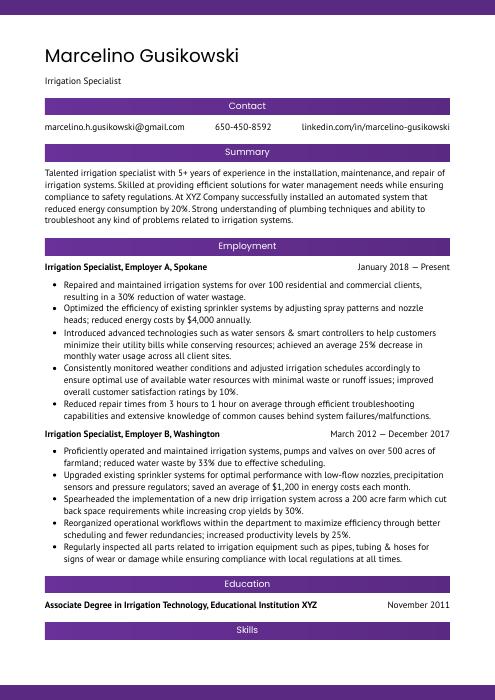 Jerboa
Jerboa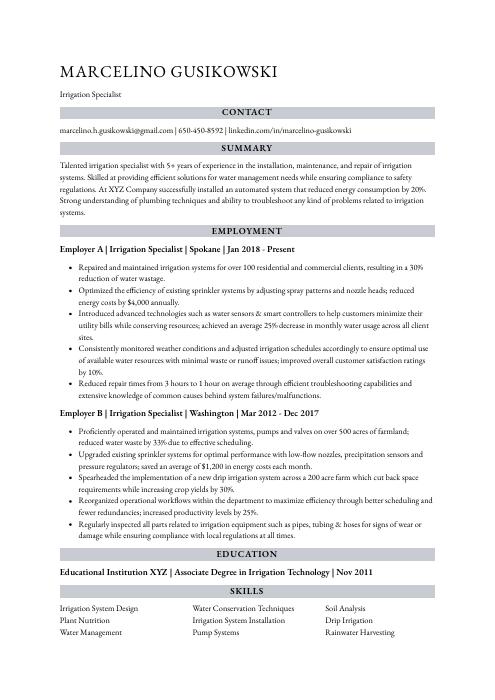 Numbat
Numbat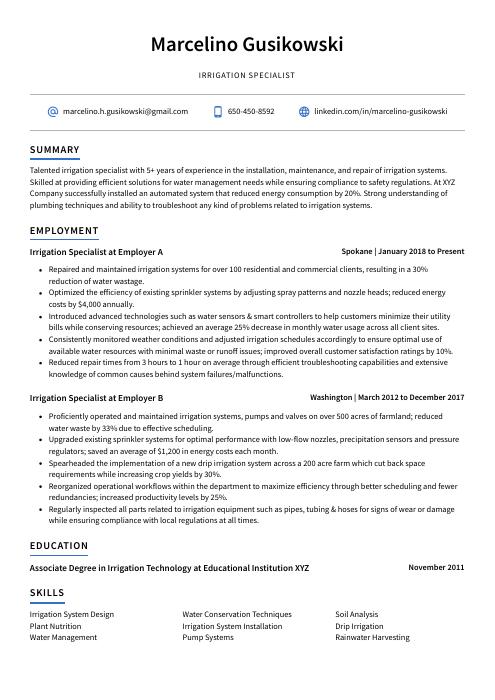 Axolotl
Axolotl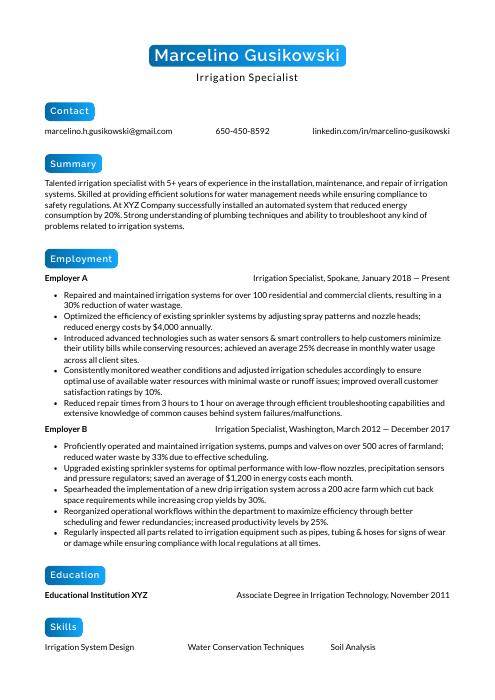 Kinkajou
Kinkajou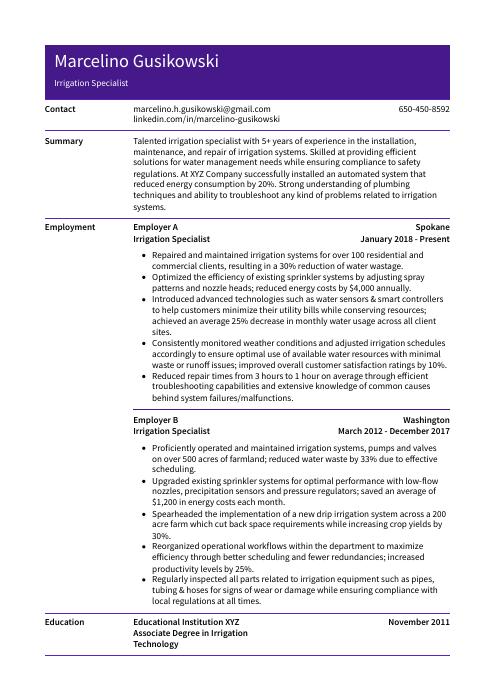 Pika
Pika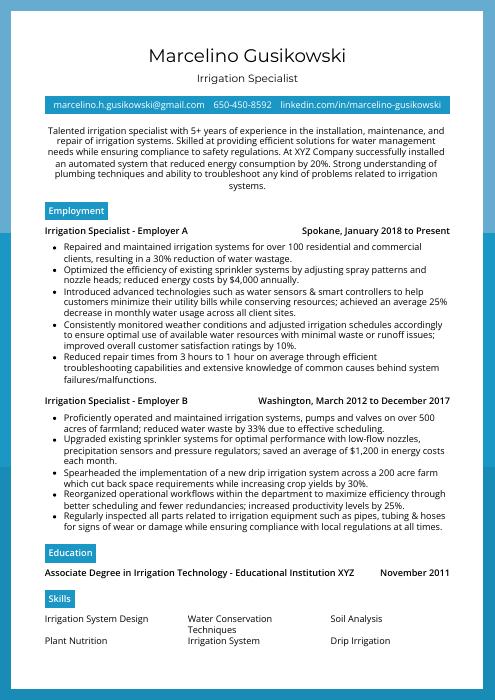 Rhea
Rhea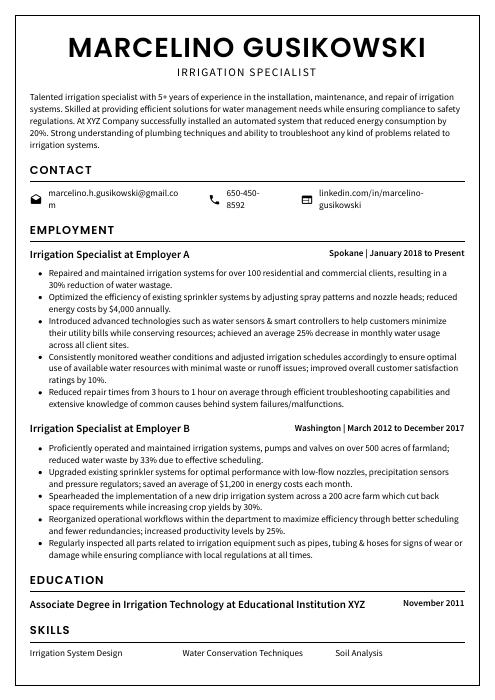 Cormorant
Cormorant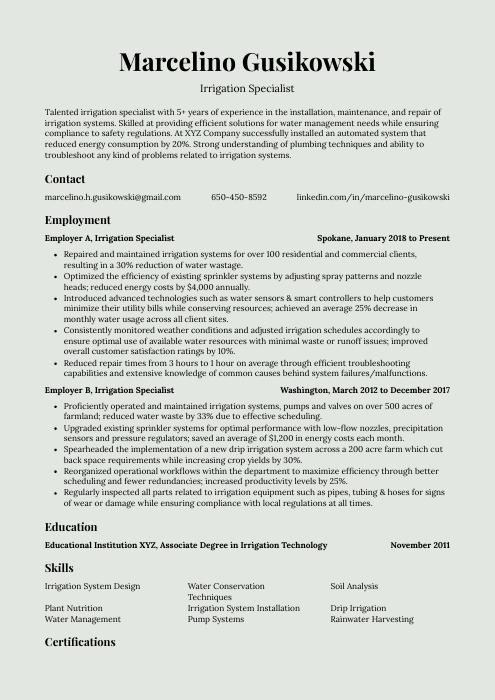 Saola
Saola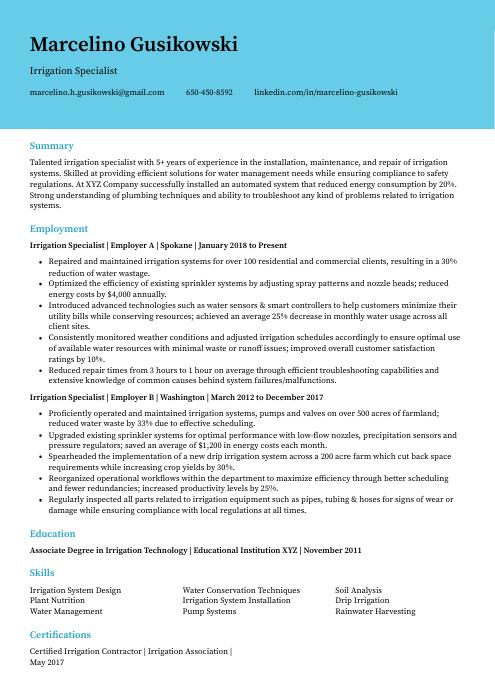 Dugong
Dugong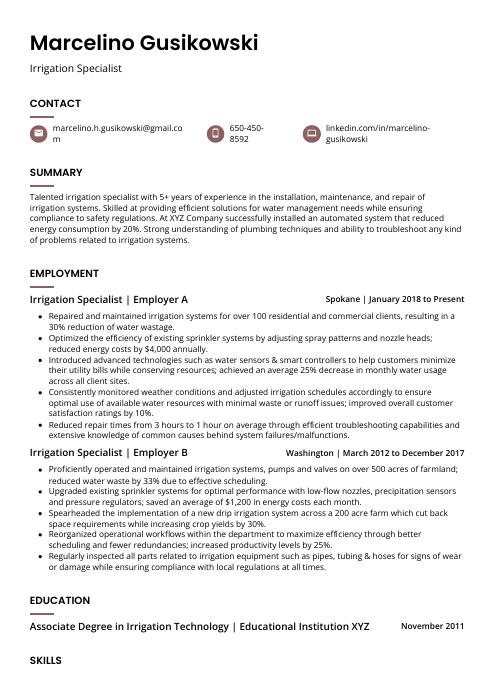 Fossa
Fossa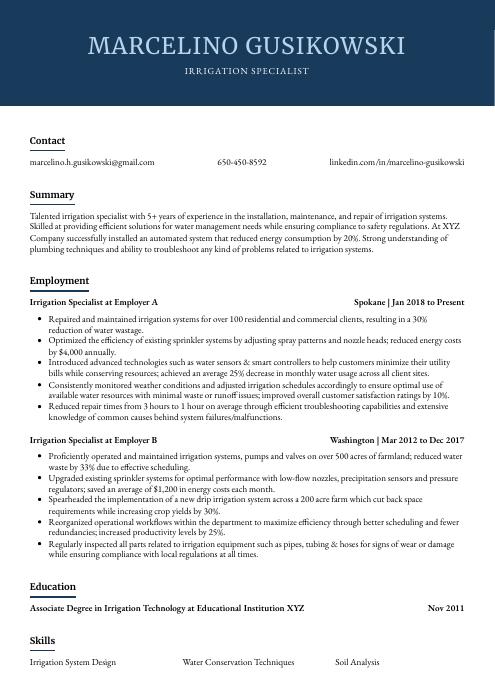 Bonobo
Bonobo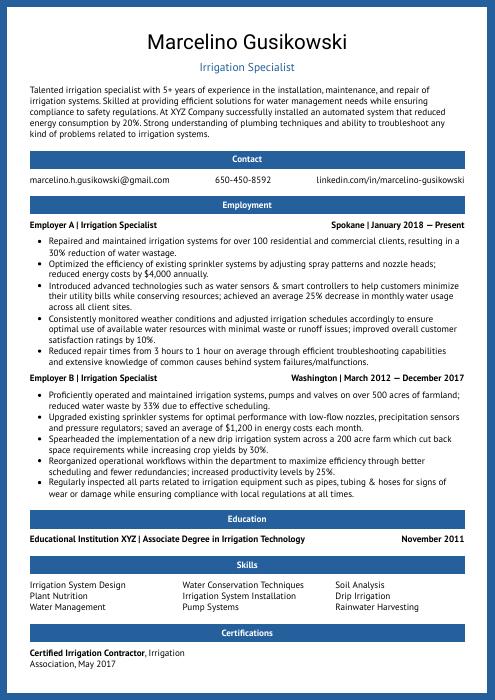 Ocelot
Ocelot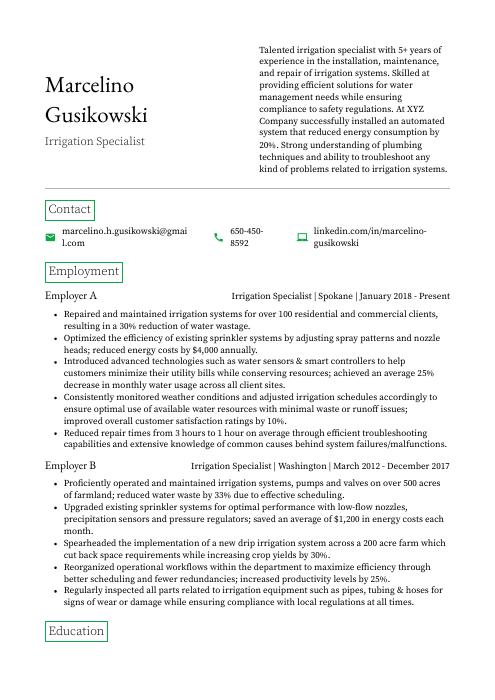 Quokka
Quokka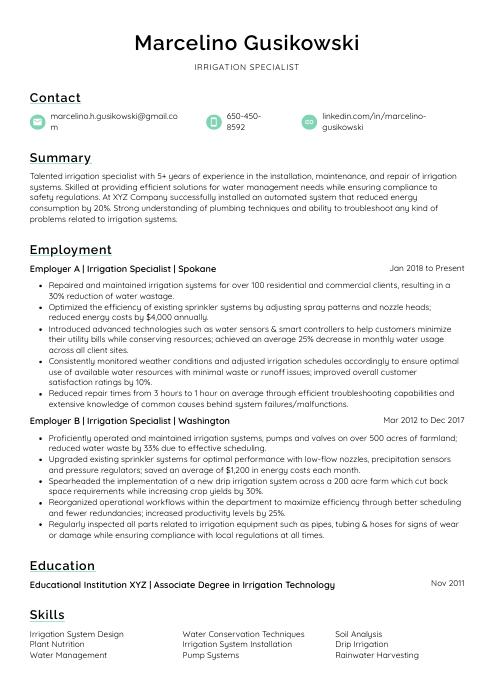 Lorikeet
Lorikeet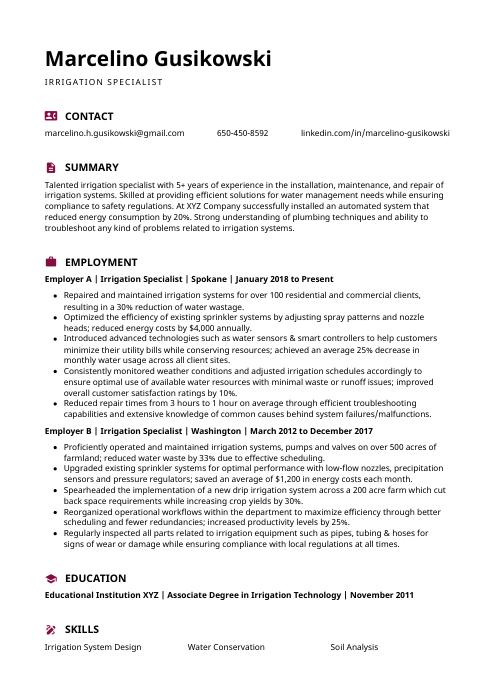 Hoopoe
Hoopoe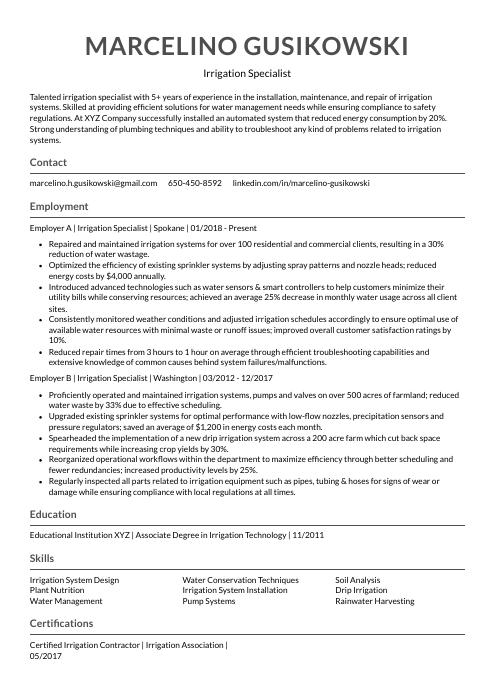 Indri
Indri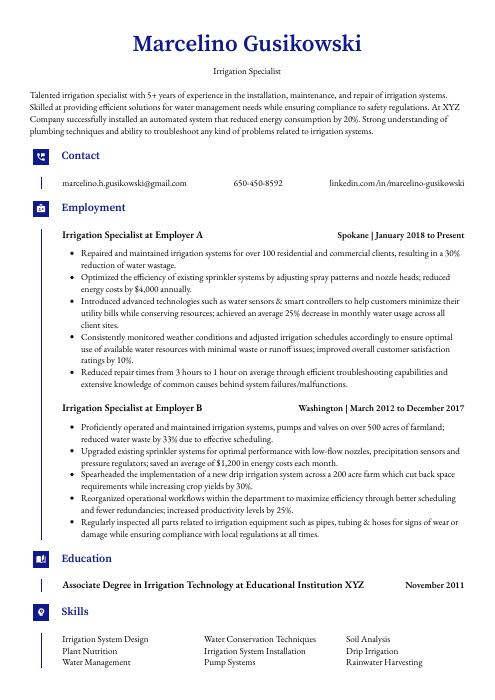 Gharial
Gharial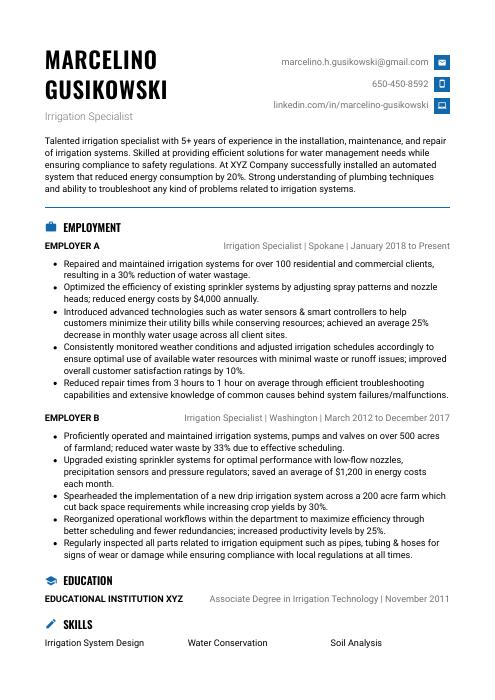 Echidna
Echidna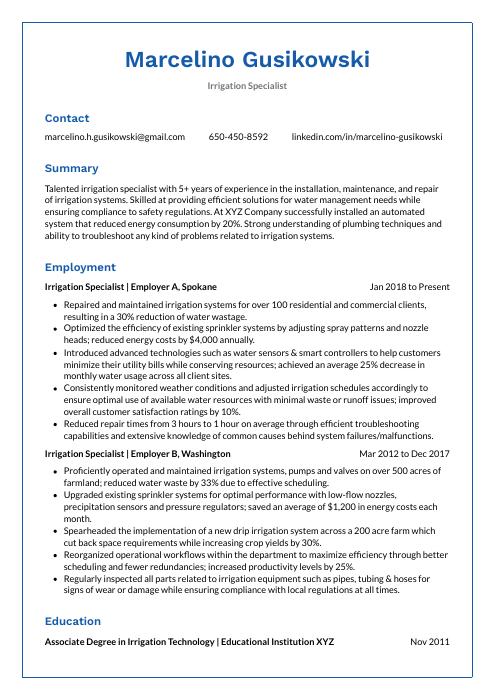 Markhor
Markhor Rezjumei
Rezjumei
